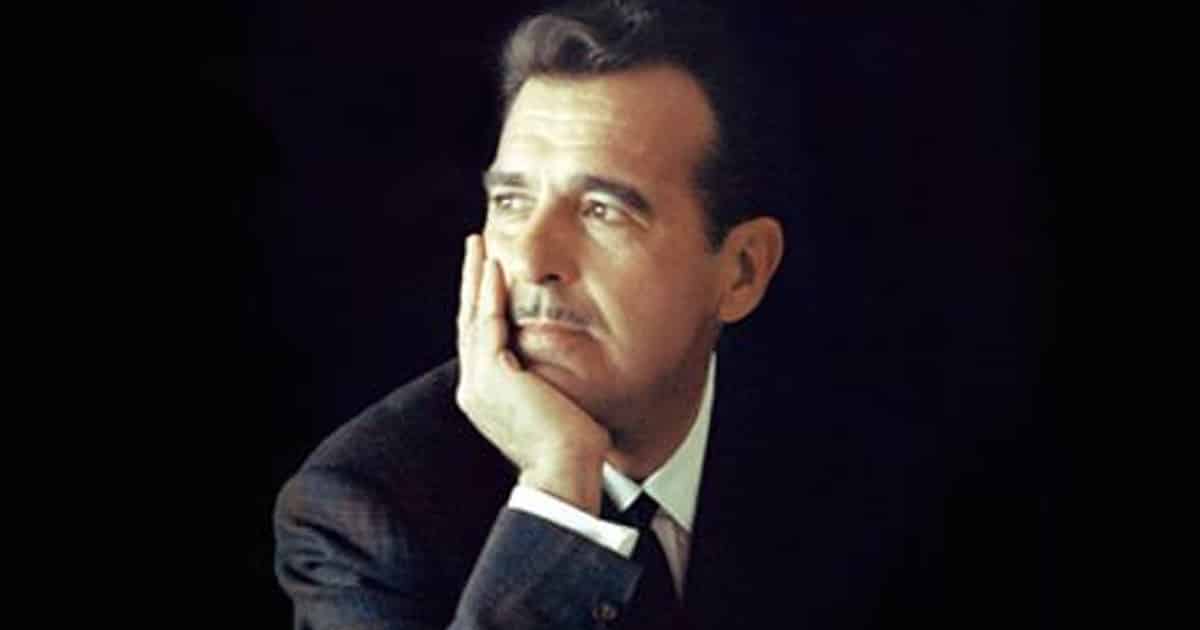
by
Updated
Updated
Updated
A versatile, deep-voiced performer, Tennessee Ernie Ford became the model for future generations of multi-faceted country entertainers. The Bristol, Tennessee native who was once a golden-voiced radio, quickly moved into a long, fruitful recording career.
And over his long career, Ford’s popularity and recognition transcended country music. He sang everything from rock & roll to gospel hymns. He has recorded over a hundred albums and earned numerous honors and awards, including the Presidential Medal of Freedom – the nation’s highest award for civilians. He was also among the earliest and most successful “crossover” artists to come out of country music.
Most notably, he enjoyed tremendous success with these songs.
10. The Cry of the Wild Goose
Ford released his version of “The Cry of the Wild Goose” in 1950, though it was originally released as a 78 rpm vinyl record by Frankie Laine.
9. You Don’t Have to Be a Baby to Cry
The song was first recorded in 1950 and was best known in its 1963 recording by the British girl group The Caravelles. Ford recorded the song in 1956 and used it as a ‘B’ side to his hit song “Sixteen Tons.”
8. I’ll Never Be Free
Performed by Ford and American pop and jazz singer Kay Starr, the song reached No. 2 on the U.S. country chart and No. 3 on the U.S. pop chart in 1950.
7. Hey, Good Lookin’
The song was written and recorded by Hank Williams in 1951, and his version was inducted into the Grammy Hall of Fame in 2001. Williams said he penned “Hey Good Lookin'” in only 20 minutes while on a plane with musicians Jimmy Dickens, Minnie Pearl, and Pearl’s husband, Henry Cannon. The hit song was supposed to be recorded by Dickens, but Williams recorded it himself and jokingly told Dickens, “That song’s too good for you!”
Ford covered the song with Helen O’Connell in the same year.
6. How Great Thou Art
The song started out as a hymn written in 1885 by the Rev. Carl Boberg, a Swedish evangelist, who set it to a Swedish folk melody and was eventually produced into an English version. The author, Carl Boberg himself, gave the following details about the inspiration behind his poem:
“It was that time of year when everything seemed to be in its richest coloring; the birds were singing in trees and everywhere. It was very warm; a thunderstorm appeared on the horizon, and soon there was thunder and lightning,” he said. “We had to hurry to shelter. But the storm was soon over, and the clear sky appeared. When I came home, I opened my window toward the sea. There evidently had been a funeral, and the bells were playing the tune of ‘When eternity’s clock calls my saved soul to its Sabbath rest.’ That evening, I wrote the song, ‘O Store Gud.'”
“How Great Thou Art” gained worldwide popularity; in fact, there are over seventeen hundred documented recordings of the hymn. Tennessee Ernie Ford’s version is one of the most notable ones.
5. The Ballad of Davy Crockett
The song gained popularity when it was introduced on ABC’s television series Disneyland. The song would later be heard throughout the Disneyland television miniseries Davy Crockett, first telecast in 1954.
Ford’s version was released in 1955 and peaked at No. 4 on the weekly country chart and No. 5 on the weekly pop chart.
4. Mule Train
Originally released in 1947, “Mule Train” is a cowboy song. The singer fills the role of an Old West wagon driver who spurs on his team of mules pulling a delivery wagon. As he goes on with his work, the driver mentions the various mail-order goods he delivers to far-flung customers.
Tennessee Ernie Ford’s version was released in 1949, featuring whip-cracking sound effects and shouting by the driver as he spurs on the mules. It reached No. 1 on the Billboard country chart and became the first song to top the component “Country & Western Records Most Played by Folk Disk Jockeys.”
3. Give Me Your Word
The song was Ford’s first hit in the United Kingdom, reaching No. 1 in the U.K. Singles Chart in 1955, and remained at the top of the U.K. Singles Chart for seven weeks.
2. The Shotgun Boogie
Tennessee Ernie Ford, who was a hunter himself, wrote “The Shotgun Boogie” – it turned out to be his most successful release on the Country & Western charts. The song stayed on the charts for a total of twenty-five weeks, and at No. 1 for fourteen weeks.
1. Sixteen Tons
The megahit “Sixteen Tons” was Ford’s career-defining song. With Ford snapping his fingers and belting the mournful lyrics in his caramel-rich bass-baritone voice, the record sold like wildfire.
The song that tells the plight of coal miners making low wages, working long hours, and trying to get out of debt is absolutely timeless, and it resonated with people around the globe. Yet the U.S. government considered it as possibly seditious and placed its songwriter, Merle Travis, on a watchlist. They claimed the song to be supportive of organizing workers and Communism.
Still, “Sixteen Tons” made Ford a crossover star and it became his signature song. It has also been covered by Elvis Presley, the Weavers, Stevie Wonder, Tom Morello, and countless others.
Tags
Tennessee Ernie Ford





